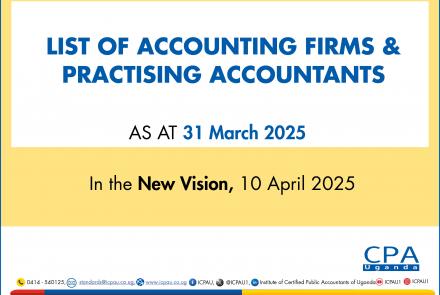By Caroline Nassuuna
Communications Officer
Institute of Certified Public Accountants of Uganda
Accounting firms perform several services which are critical to the growth of organisations. These services tantamount to practising accountancy as determined by the Accountants Act, 2013 and they include but are not limited to accounting and financial reporting, audit and assurance, tax, financial management, cash flow management, risk management and transaction services, restructuring and insolvency practice, and general business advisory. Indeed, all organisations have benefited from accountancy services at some point.
But who should practise accountancy? According to the Accountants Act, a person must be registered as a Certified Public Accountant to practise accountancy and must apply to the Council of the Institute of Certified Public Accountants of Uganda (ICPAU) for a certificate of practice. They must also obtain a licence for their firm, issued by ICPAU.
The Accountants Act defines practising accountancy as the performance of services involving auditing, verification and certification of financial statements or related reports from the public in exchange for payment.
Therefore, anyone intending to practise accountancy must follow the law. Members of the public should note that it is an offence to practise accountancy without a Certificate of Practice issued by ICPAU. It also goes without saying that if you are dissatisfied from the services of a non authorized person, there is no recourse for your grievance.
Even those who wish to offer non-assurance services only, such as accounting and bookkeeping, advisory, valuation, taxation, company secretarial, and insolvency and financial planning service, among others, must obtain a Certificate of Practice and a firm licence.
In 2021, ICPAU introduced a new licensing regime which provides for two broad categories of Certificates of Practice. The first category permits a practising accountant to provide all types of accountancy services (including audit and assurance services). The second category of Certificates of Practice permits the holder to provide only non-assurance services (that is excluding audit and assurance services). Therefore, those intending to practise accountancy should apply to ICPAU and an appropriate certificate shall be issued based on one’s level of experience, interest, among others.
ICPAU issues Certificates of Practices and firm licences as part of its regulatory mandate. This is intended to ensure that the quality of services offered to the public are in line with the global standards on accountancy services. Additionally, the Institute, through the Quality Assurance Board executes the audit quality review programme to monitor audit quality in the country. Such mechanisms are intended to ensure that the public finds comfort in services of practising accountants who are registered, monitored but also subscribe to a professional code of ethics that guide their overall conduct.
Members of the public are encouraged to use the services of licensed accounting firms. A search for a licensed firm can be performed via the Institute’s website, www.icpau.co.ug. Please note that financial statements audited by non-licensed firms are inadmissible as part of periodical regulatory returns, but also in the Courts of Law. The ICPAU is working on a document identification project that is intended to ease verification of financial statements. The Institute further encourages members of the public to report quacks through icpau@icpau.co.ug
ICPAU was established by the Accountants Act to regulate and maintain the standard of accountancy in Uganda, and prescribe and regulate the conduct of accountants and practising accountants in Uganda. For more information on accountancy practice, please write to standards@icpau.co.ug



